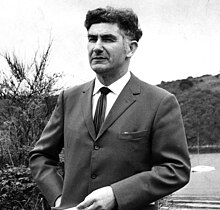Charlez ar Gall
Charlez ar Gall | |
|---|---|
 Gall in 1966 | |
| Born | Charles Le Gall 5 March 1921 Hôpital-Camfrout, Finistère, France |
| Died | 3 November 2010 (aged 89) Brest, Finistère, France |
| Occupations |
|
| Employer | ORTF |
| Spouse | |
| Children | 2 |
Charles Le Gall (5 March 1921 – 3 November 2010), known as Charlez ar Gall, was a Breton radio broadcaster, activist, and writer. After a career in radio, he worked as a broadcaster for the ORTF's Breton-language programming until his resignation in 1974, and along with his wife Chanig ar Gall, was a pioneer in Breton-language broadcasting.
Biography
[edit]Early life
[edit]Charles Le Gall was born into an agricultural family on 5 March 1921 in Hôpital-Camfrout, a commune in the department of Finistère.[1][2] Despite being raised in a Breton-language household, he learned French while at school.[3] In 1937, he became a student at the École Normale d'Instituteurs in Quimper, remaining there until he started teaching in 1940.[4] After starting his teaching career in his native Hôpital-Camfrout, he later moved on to Brest and Argol.[3][1] As a teacher, he refrained from penalizing students for speaking Breton and also ran Breton-language classes for adult students.[5][1]
While teaching in Argol, he met Jeanne-Marie Guillamet, later Chanig ar Gall.[3] The two married in 1942, and they later had two daughters.[1] After the end of World War II, he moved to Brest with his wife and joined the Ar Falz Breton-language association.[1] His last teaching post was at the Dupuy de Lôme school.[6]
Broadcasting career
[edit]Charlez ar Gall began working in Breton-language radio in 1947.[7] During the late 1950s,[a] he became the host of Radio Quimerc'h's Breton-language programme, succeeding Pêr-Jakez Helias.[4][1] Since the station had no studio, he broadcast from his own office, doing so at least 800 times for the next seventeen years.[1] In 1962, a song that he aired, which was about the 1961 occupation of Morlaix, was deemed "seditious", causing him to receive a month-long suspension by order of the Minister of Information.[1]
In 1964, Charlez ar Gall was hired by ORTF executive Louis Le Cunff for a ninety-second Breton-language daily news segment at the new ORTF Télé-Bretagne (now France 3 Bretagne),[5] becoming the first to do so.[1] Fañch Broudig described it as "the first fixation point for TV in Breton".[5] In 1971, he and his wife became part of the first Breton magazine programme, Télé-Bretagne's Breiz o veva, with him as the host.[8][4] His work for the news also led to a renewal of interest in the Breton tradition of fest noz.[5] In 1974, he resigned from his job after his report on a committee concerning people jailed for suspected ties to the Breton Liberation Front was censored.[1][5] He and his wife were later known as pioneers of Breton-language broadcasting.[9][8]
Later life and death
[edit]Charlez ar Gall developed an interest in the history and culture of Brittany.[6][4] He was a co-founder of the language activism organization Emgleo Breiz, contributed to the magazine Brud Nevez, and worked with Job Jaffré on a book about Breton culture, Breizh hor bro (1955).[6][1] He was vice-president of the Société d'études de Brest et du Léon and a member of the Société archéologique du Finistère.[2] He was also part of the Conseil supérieur de l'audiovisuel's Brittany committee.[4]
Charlez ar Gall received awards and praise throughout his life. He and his wife were awarded with the Order of the Ermine in 1990.[7] He was also made a Commandeur of the Ordre des Palmes Académiques.[1] The Independent said that he was "one of those who strove to rekindle the flame of Breton patriotism in such difficult circumstances".[1] Le Télégramme described him as a "great voice of radio and television in Breton".[2]
Charlez ar Gall died on 3 November 2010 in Brest.[1] His archives are held in the Bibliothèque Yves-Le-Gallo at the University of Western Brittany's Centre de Recherche Bretonne et Celtique.[4]
Notes
[edit]- ^ Sources differ over the exact year. Although the Centre de Recherche Bretonne et Celtique and The Independent say that this occurred in 1959, Ouest-France says 1958.[4][1][5]
References
[edit]- ^ a b c d e f g h i j k l m n o "Charlez ar Gall: Pioneering broadcaster in the Breton language". The Independent. 10 December 2010. Retrieved 11 September 2023.
- ^ a b c "Charlez ar Gall. Disparition d'un pionnier des médias en langue bretonne". Le Télégramme (in French). 4 November 2010. Retrieved 11 September 2023.
- ^ a b c "Charlez ar Gall (1921-2010)". Dielloù Charlez ar Gall / Archives Charles Le Gall (in French). Retrieved 11 September 2023.
- ^ a b c d e f g "Fonds Charlez Ar Gall". Centre de Recherche Bretonne et Celtique. Retrieved 11 September 2023.
- ^ a b c d e f ATTARD, Philippe (9 July 2015). "Argol: Channig et Charlez ar Gall au fronton de l'école" (in French). Retrieved 11 September 2023.
- ^ a b c Broudig, Fañch (7 June 2017). "Charlez et Chanig ar Gall : une causerie aux Cahiers de l'Iroise à Brest". Le blog "langue-bretonne.org" (in French). Retrieved 11 September 2023.
- ^ a b "Charlez AR GALL ✞". Institut culturel de Bretagne (in French). Retrieved 11 September 2023.
- ^ a b "Chanig ar Gall est décédée lundi, à Brest". maville.com (in French). 11 April 2012. Retrieved 17 September 2023.
- ^ "Nécrologie: Chanig Ar Gall, pionnière des bretonnants à la télé". Le Télégramme (in French). 11 April 2012. Retrieved 11 September 2023.
